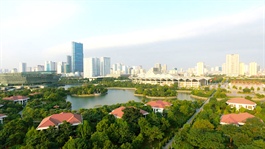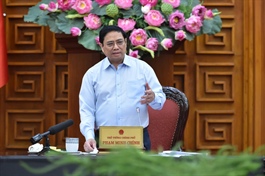Vietnam can emulate Japan’s circular economy vision
Vietnam can emulate Japan’s circular economy vision
Vietnam has set clear dual growth goals of becoming a high-income country by 2045 and meeting carbon neutrality by 2050.
At the COP26 climate summit last year, Vietnamese Prime Minister Pham Minh Chinh highlighted the need to “transform the development model into a green, circular, sustainable, inclusive, and humanistic economy”.
The net-zero commitment made and the ongoing revision of the draft National Climate Change Strategy and the draft Power Development Plan VIII to align with net-zero emissions by 2050 – taken together with the integration of a circular economy (CE) into the country’s decade-long socioeconomic development policies – are the combination that marks a major cornerstone in Vietnam’s sustainable energy transition, with CE at its centre.
The Japanese government is now collaborating with the Vietnamese government to support the development of a national action plan on CE for Vietnam. Back in 1999 when the first CE version was developed in Japan, the government aimed at reducing the amount of industrial waste and limit the use of natural resources.
Therefore, Japan has made efforts to implement different measures for improvement of production efficiency and product use efficiency, as well as appropriately handle used and recycled products. Based on the CE vision, Japan made significant improvements in the promotion of extended producer responsibility (EPR), increasing the recycling rate and expanding the number of environmental-related businesses.
The first point is the solution for the input of the production process, such as increasing the proportion of recycled material that is used in the product; raising the energy efficiency of the product itself; and implementing EPR. In Japan, all these solutions have been institutionalised and effectively enforced by different incentive programmes and supports from the government.
The second point is the result achieved in appropriate disposal and recycling. Japan has developed policies to build a material-cycle society based on the nation’s Basic Act on Establishing a Sound Material-Cycle Society.
Recycling methods and requirements for each category of goods, including container packaging, home electrical appliances, food, construction waste, automobile parts, and other appliances are clearly stipulated in different recycling acts.
Japanese environmental laws and regulations not only emphasise the circulation of material and resources, but also promulgate transparent administrative measures for proper waste disposal/treatment and a manifest system was established in Japan to monitor the waste treatment process and prevent illegal dumping. Additionally, we also have a regulation on preventing littering and improper disposal of waste.
In recent years, realising the problem of plastic waste, Japan has started a number of initiatives to increase people’s awareness of reducing plastic use. For example, when shopping at a supermarket, the customers must pay for plastic bags, and this will make them pay more attention to and be more conscious in reducing the use of plastic products.
Behind the achievements already made are practical lessons that we think would be useful for Vietnam. In Japan, there are also a lot of problems that arise and require specific solutions. Japan’s recycling promotion policies originated from the serious lack of landfills. Since the 1992 Rio Summit, environmental issues have received more attention. It is very important to widely share the problems that Japan faced which have led to the need for policy formulation.
In terms of CE policy framework development in Japan, traditionally we have the spirit of “Mottainai” which means “waste not, want not”. This was embraced in the Japanese government’s aforementioned basic act on a sound material-cycle society, which was enacted in 2000.
Back then, similar to Vietnam these days, we were facing pressing problems of increasing waste amount and limited land for waste treatment facilities. The law affirmed Japan’s effort to move away from mass production, mass consumption, and mass disposal, and guided the development of by-laws and regulations for individual waste and recycling.
To further push for a CE in Japan, the vision was updated in 2020 to encourage transformation to a virtuous cycle of environmental and economic growth, especially against the backdrop of the climate crisis.
Last but not least, we have been continuously involving in waste management through activities such as promoting the 3Rs of reduce, reuse, and recycle, as well as source separation in the past.
Now, it is high time to boost our cooperation with Vietnam’s Ministry of Natural Resources and Environment to establish a robust legal foundation and policy directions to enable CE models in this country.

























